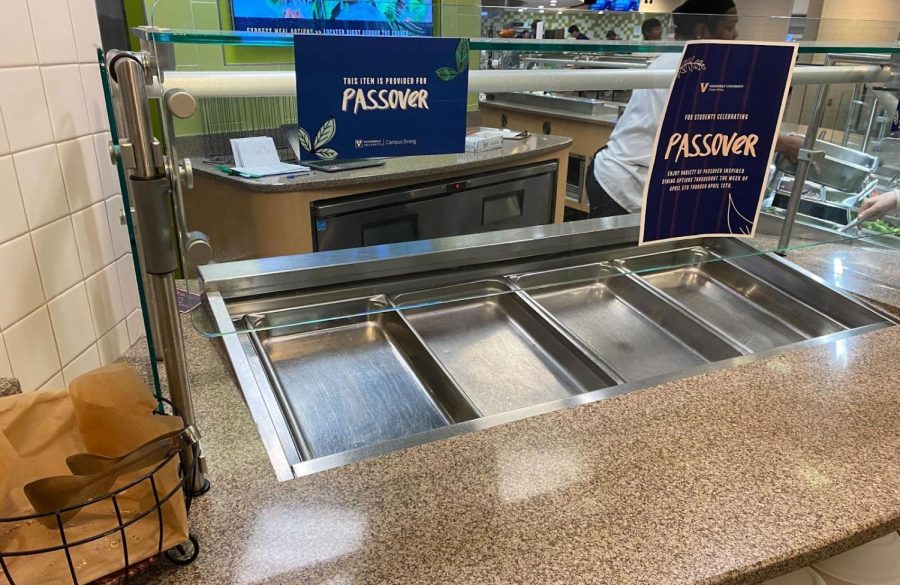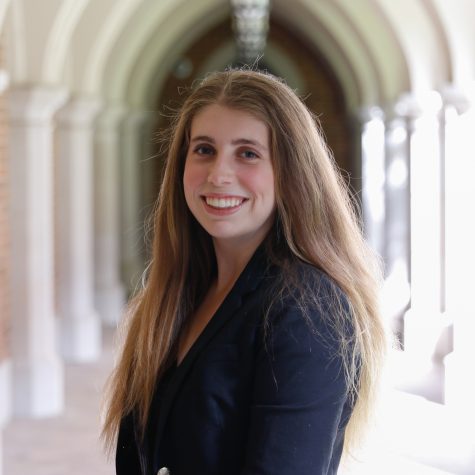Vanderbilt Campus Dining provided “Passover-inspired” meals from April 5-13. Students observing Passover alleged that the food was not in accordance with kosher for Passover standards despite initially being advertised as such.
A university representative said Campus Dining reached out to student leaders of Vanderbilt Hillel and Vanderbilt Chabad in February to discuss plans for Passover, leading to a meeting with Chabad student leaders in early March. Chabad student leaders did not respond to The Hustler’s requests for comments.
“Vanderbilt Chabad acknowledged that no Campus Dining facility is kosher and suggested honoring Passover through menu offerings,” the representative said. “Specific menus were designed with these student leaders and served daily at three of the six dining halls throughout Passover.”
Vanderbilt Hillel President Carly Stewart, a senior, stated that Hillel leaders did not meet with Campus Dining. According to email chains obtained by The Hustler, Hillel leaders tried to arrange a time for Campus Dining to attend one of its executive board meetings, but Campus Dining never confirmed a time to meet after back and forth communication. The representative and Stewart said Hillel coordinated with Munchie Marts to provide other accommodations for students observing Passover, including mobile meal ordering on the GET app.
Menu options for Passover included matzah stations with cream cheese, butter and fruit jams, an increase of fruits and vegetables at salad bars and matzah offered as a “base” at deli and pizza stations, which the representative said was all per the request of Chabad student leaders.
“We did our best to provide Passover accommodations that would meet the student need during Passover this year and acknowledge that we can always do better,” the representative said. “If students have additional feedback to improve the program for next year, we would love to meet with these students and learn how best we can improve moving forward.”
Stewart said the term kosher can only be applied to food made with kosher ingredients in a kosher kitchen, which involves separating dairy and meat and avoiding contact with non-kosher products. During Passover, some Jewish people consider a wider set of dietary restrictions to be non-kosher. Stewart added that Jewish people are not allowed to eat chametz — leavened grain — during Passover, but that some, including herself, also abstain from eating kitniyot, which includes rice, corn, soy and legumes.
“I emailed Campus Dining to ask them if they had purchased kosher meat and if they were using a separate part of the kitchen. The answer was no to both questions,” Stewart said.
After expressing her concerns to Campus Dining about the presence of kitniyot in some recipes, Stewart said Campus Dining Chef Brian Cochrane told her that soy sauce was removed from its apricot chicken dish and asked her to identify other recipes containing kitniyot.
“Food cannot be labeled as kosher when it isn’t made in a kosher kitchen and its ingredients aren’t strictly kosher. Campus Dining told me that they hope to avoid kitniyot in the future but that it wasn’t possible this year,” Stewart said. “When looking at the menus, I also saw a menu at Rothschild for April 12 that had turkey gravy made with wheat flour, which is chametz.”
Due to these discrepancies, Stewart said she did not eat any of the Passover options offered by Campus Dining as it would have violated her religious obligations. Stewart stated that she informed Campus Dining that its food was not kosher for Passover. Campus Dining then updated its online announcement on April 6 to advertise the food as non-kosher but “Passover-inspired.”
“This was an error caused by miscommunication and was remedied immediately. We regret the error and are proud of the Passover accommodations offered to meet the student need,” the university representative said.
Rabbi Shlomo Rothstein, director of Vanderbilt Chabad, said advertising a menu to be kosher but using non-kosher kitchens and food products is misleading.
“I think [Campus] Dining should offer a proper kosher for Passover meal plan,” Rothstein said. “It would entail working with a kosher supervisor to kosherize a dedicated kitchen and oversee all aspects of the food ordering, prep and service. Without doing this properly, they cannot call food prepared in their kitchen kosher, let alone kosher for Passover.”
Rothstein said Campus Dining did reach out to Chabad student leaders about “Passover-inspired” menu options and packaged food items to have in the dining halls, serving real kosher for Passover food is different.
“That conversation needs to be had with a Rabbi, and Vanderbilt needs to be willing to commit resources to making that happen,” Rothstein said. “Vanderbilt Chabad is uniquely set up to help Vanderbilt have proper kosher for Passover meals, and we’d love to work to make that happen.”
First-year Joel Berinstein described the kosher for Passover options as “lackluster” and “nonexistent.”
“The only [kosher] thing that was offered in most of the dining halls was matzah, which is kosher for Passover, but I’m already getting that for free from either Hillel or Chabad,” Berinstein said. “It’s nice that they have it because it opens up a lot of dialogue between me and my friends, but I don’t see it as a [full] kosher for Passover [meal].”
Berinstein said he is upset that Campus Dining did not provide more options, given that it more robustly expanded options for students observing Ramadan.
“Munchie is offering certain meals, and they have iftar meals every day at EBI,” Berinstein said. “It’s upsetting to know that dining could take those steps [for Passover], but they really haven’t.”
Berinstein said Hillel and Chabad have been helpful by providing lunches and dinners, though finding kosher breakfast has been difficult.
“I wake up and want to eat something before class, so I’ve just been eating the boxes of matzah that I’ve collected,” Berinstein said. “Being in this environment is very different for a lot of Jewish kids who grew up in Jewish areas with a Jewish family, and I understand why some kids have bypassed being kosher for Passover because it’s very easy to bend the rules when you find yourself in difficult situations.”




